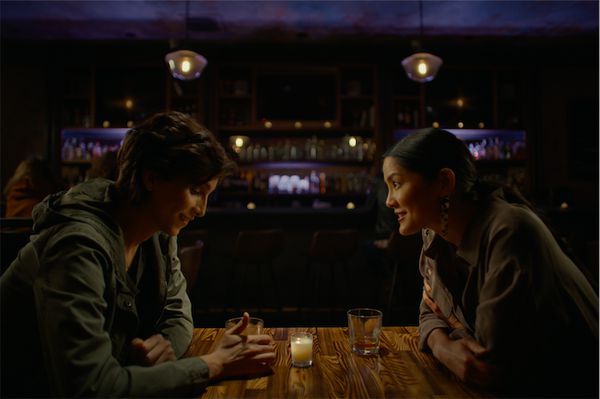Eye For Film >> Movies >> See You Then (2021) Film Review
See You Then
Reviewed by: Jennie Kermode

It has been a long time since Kris (Pooya Mohseni) and Naomi (Lynn Chen) were together - around ten years, in fact. Long enough to have moved on, to let the difficult aspects of the past go? That's what they both seem to be hoping when they meet up one evening to go for a drink. A lot of things have changed between them. Kris never told Naomi, back then, that she was trans. She has since transitioned, changing their dynamic and the way that it's perceived by others. Naomi has married, had two children and drifted away frim the career path once central to her goals in life. They meet almost as strangers, but the weight of their shared past, for all their lingering affection, gradually bears down on them.
Intimate and sometimes emotionally intense, Mari Walker's feature début explores a lot of ground in a single conversation but, inevitably, leaves some things unsaid. What begins as an amicable evening between friends, full of laughter and the kind of bonding that intensifies between women in the presence of obnoxious men, inevitably gives way to recriminations and expressions of pain. Their separation was not amicable and was complicated by secrets on both sides. Kris envies Naomi's family life and Naomi envies Kris' decision to go after what mattered to her most, prompted by the encounter to explore the ways in which the life she has built fails to live up to her youthful imagining. Cruel remarks are exchanged of the sort only really possible between people who have loved each other (and perhaps, to a degree, still do). Both women seem as if they feel a urgent need to express something which neither can quite grasp.
Although there are plenty of transition stories out there today, there's still a dearth of films in which trans people simply exist as individuals who have had certain experiences but are not wholly shaped by them. Kris' life has not been marked by the tragedies that writers usually reach for. Walker (who, like Mohseni, is trans herself) uses the expectation of prejudice to explore other issues around the supposed boundaries of womanhood, exploring socially constructed norms around motherhood, occupation and race. Each of these characters has struggled with being outside those boundaries and has unresolved internal conflicts related to them. If they can't reconcile themselves to any kind of ongoing friendship, might they at least take something from this encounter that enables them to flourish individually?
With the tension ebbing and flowing, Walker keeps us guessing as to where they will end up. It's a beautifully written script and the performances are top notch. Inevitably, the form of the story presents some challenges. At times it feels a little artificial (conversations after such a long time can feel that way in real life too), and there's a staginess about it despite Walker doing her best to move her protagonists around and keep things visually interesting. it's at its best when she relaxes and allows her actors to take control, keeping the camera close to their faces, letting their interaction beguile viewers into forgetting about their surroundings altogether.
An excellent first film which has important things to say but always put its characters first, See You Then is a natural fit for South by Southwest but one hopes that it will get the chance to be seen by a much wider audience.
See You Then is available on Digital Download in the UK from 11 April.
Reviewed on: 17 Mar 2021
















